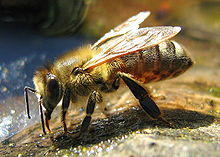Melittology (from Greek μέλιττα, melitta, "bee"; and -λογία -logia) is a branch of entomology concerning the scientific study of bees. It may also be called apicology. Melittology covers the species found in the clade Anthophila within the superfamily Apoidea, comprising more than 20,000 species,[1] including bumblebees and honey bees.
Subdivisions
- Apiology – (from Latin apis, "bee"; and Ancient Greek -λογία, -logia) is the scientific study of honey bees. Honey bees are often chosen as a study group to answer questions on the evolution of social systems.
- Apidology is a variant spelling of apiology used outside of the Western Hemisphere, primarily in Europe; it is sometimes used interchangeably with melittology.
Melittological societies
Melittologists and apiologists are served by a number of scientific societies, both national and international in scope. Their main role is to encourage the study of bees and apicultural research
- International Bee Research Association
- National Bee Association of New Zealand
- British Beekeepers Association
- German Beekeepers Association
- Federation of Irish Beekeepers' Associations
Melittological journals
- Apidologie
- American Bee Journal
- Journal of Apicultural Research
- Journal of Melittology
See also
- Bee
- Honey bee
- Beekeeping
- Entomology
- I Have a Bee
- Vespology
- Melissopalynology
References
- ^ "Bees - Facts About Bees - Types of Bees - PestWorldforKids.org". pestworldforkids.org. Retrieved 2016-04-26.
